Is ZoomInfo Legit in 2025? A Complete Guide
ZoomInfo is a B2B data and sales intelligence platform that helps businesses identify, connect with, and close deals with their ideal customers. It offers access to high-quality business contact data, intent signals, and sales automation tools by using AI-driven automation and proprietary technology.
ZoomInfo collects its data from a wide range of sources, such as publicly available information on millions of websites, corporate websites, press releases, U.S. SEC (Securities and Exchange Commission) filings, job postings, and other resources. AI and algorithms detect duplicates, fill gaps, and link related information, with the help of human verification. ZoomInfo continuously refreshes its database while maintaining compliance with privacy regulations.
ZoomInfo’s pricing plans include the Lite plan, the Professional plan at $14,995 per year with 5,000 credits, the Advanced plan at $24,995 with 10,000 credits, and the Elite plan at $39,995 annually, with the largest number of features and add-ons.
User feedback on review platforms about ZoomInfo highlights common issues, such as occasional data inaccuracies, high pricing for small businesses, customer service shortcomings, and challenges with contract cancellation.
The top alternatives to ZoomInfo include BookYourData, UpLead, and Apollo.io. BookYourData is more legit than ZoomInfo due to its 97% data accuracy guarantee, flexible pay-as-you-go pricing, and 24/7 support.
What is ZoomInfo?
ZoomInfo is a GTM (Go-to-Market) intelligence platform that helps B2B companies increase their revenue growth through high-quality and buyer intent data. It provides businesses with access to high-quality business contact data, intent signals, and sales automation tools. ZoomInfo uses AI-driven automation and proprietary technology to deliver clean, accurate, compliant, and actionable B2B data sourced from public sources, machine learning, and a contributory network. This B2B prospecting tool helps sales, marketing, recruiting, and revenue operations teams of companies of all sizes build a pipeline and also improves outreach with real-time buyer intent insights.
ZoomInfo provides companies with prioritized lead lists, verified contact data, organizational charts, intent data, AI-driven account intelligence, and automated workflows that simplify deal progression and lead flow management. Companies use this data to increase their sales productivity, close deals faster, target and personalize precisely, and improve their revenue growth.
What are the use cases of ZoomInfo?
The use cases of ZoomInfo are sales teams, marketers, recruiters, financial service companies, conference organizers, startups, and manufacturers.
These use cases of ZoomInfo are listed below.
- Sales teams: ZoomInfo helps sales teams generate prioritized lead lists with verified contact data and real-time buyer intent signals. It helps sales professionals identify and connect with decision-makers faster and close more deals.
- Marketers: Marketers use ZoomInfo's account-based marketing tools, real-time intent data, and targeted campaigns to reach and engage high-value prospects. ZoomInfo helps marketers maximize their marketing efforts and optimize their campaigns across multiple channels, such as social media and email marketing.
- Recruiters: ZoomInfo provides recruiters with detailed candidate profiles, company insights, automated outreach, and talent pool management features. It helps recruiters maximize their candidate sourcing, attract top talent, and manage the hiring process.
- Financial service companies: Financial service companies use ZoomInfo to access real-time firmographics, buying signals, organizational charts, and decision-makers to prioritize accounts. ZoomInfo helps financial service companies personalize their outreach and gain market intelligence for better client acquisition and retention.
- Conference organizers: ZoomInfo helps conference organizers identify and connect with industry decision-makers, track relevant company growth or expansions, and maximize event targeting with accurate, actionable business insights.
- Startups: Startups benefit from ZoomInfo's AI-powered platform to quickly discover market opportunities, build high-quality contact lists, automate outreach, and work on their go-to-market strategies to stand out among their competitors.
- Manufacturers: ZoomInfo helps manufacturers grow their business by providing custom data solutions, accurate contact information, and real-time intent signals. The AI-powered tools of ZoomInfo help manufacturers find new distributors and expand their market outreach.
Where does ZoomInfo get its data from?
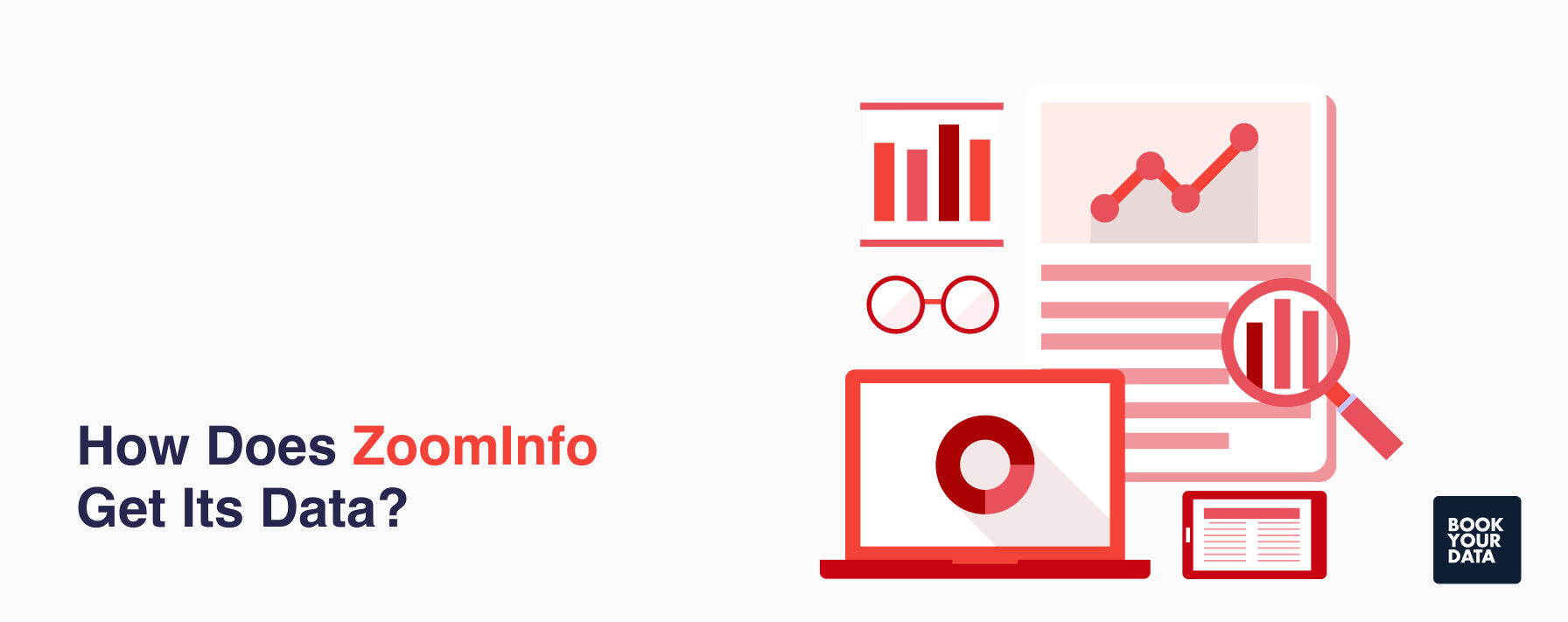
ZoomInfo gets its data from a variety of sources, such as publicly available information from over 28 million website domains monitored daily, corporate websites, press releases, news articles, SEC (Securities and Exchange Commission) filings, job postings, and other public resources. Artificial intelligence and algorithm tools of ZoomInfo detect duplicate records, fill data gaps based on patterns, and link related company and contact information to create detailed profiles. This GTM platform also uses human researchers to check the data’s reliability for targeted and precise outreach.
How reliable is ZoomInfo's database?
ZoomInfo’s database is reliable because it collects data from machine learning, proprietary technology, public sources, and a contributory network, which also includes data contributions by users of its Community Edition. This B2B prospecting tool sends notification emails annually to business contacts when new data is added to the database and provides multiple easy opt-out options to maintain data privacy and compliance. ZoomInfo’s data accuracy varies based on different factors such as industry type, geographic region, and contact seniority. BookYourData offers a 97% data accuracy guarantee, while ZoomInfo relies on AI-driven automation to continuously refresh and update its database.
How does ZoomInfo ensure compliance with privacy laws and regulations?
ZoomInfo ensures compliance with privacy laws and regulations by holding certifications like ISO 27001 and ISO 27701. These certifications show its advanced information security and privacy controls, and the company undergoes annual TRUSTe (TrustArc) validation as well as compliance checks for GDPR (General Data Protection Regulation) and CCPA (California Consumer Privacy Act) practices.
The company collects data through proprietary technology, public sources, licensed third parties, machine learning, and a contributory network, as its data is transparent and requires consent. Zoominfo provides clear privacy notices, opt-out mechanisms, and data access requests to help individuals control their personal information. It also maintains strong internal records, conducts regular audits, and partners with data processing providers who comply with similar privacy standards.
Their Privacy Policy and Terms of Service clearly outline data use, user rights, and compliance commitments. ZoomInfo handles data requests from individuals or authorities through advanced compliance tools like its Compliance API.
What are the pricing plans of ZoomInfo?
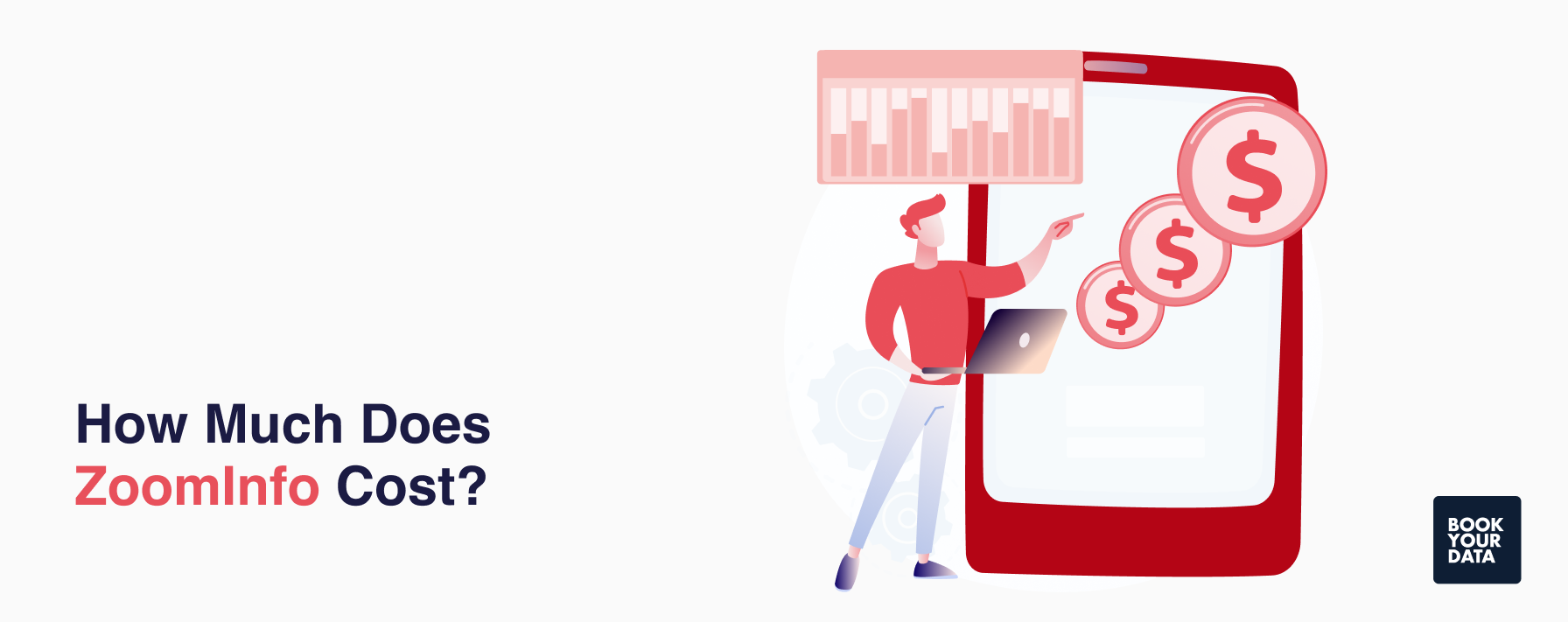
The pricing plans of ZoomInfo are Lite, Professional, Advanced, and Elite. The cost of each pricing plan depends on the user's needs.
These ZoomInfo pricing plans are described below.
- Lite plan: The Lite plan of ZoomInfo costs $0 and allows users to submit a form on the ZoomInfo website to request its features, such as contact and company search.
- Professional plan: ZoomInfo’s Professional plan costs $14,995 per year and offers 5000 credits annually. Additional users cost $1,500 each, and businesses get a discount if they have more than 20 users.
- Advanced plan: ZoomInfo’s Advanced plan costs $24,995 annually and offers 10,000 annual bulk credits with 1,000 credits per user. The companies with a large number of users are eligible for discounts, and adding additional users costs them $2,500 each.
- Elite plan: ZoomInfo’s Elite plan costs $39,995 per year and offers 10,000 annual bulk credits and 1,000 monthly credits for each user, but the per-user fee is the same as the Advanced plan.
What are the most common complaints about ZoomInfo?
The most common complaints about ZoomInfo are data inaccuracy, pricing concerns, and customer service issues. Users have experienced problems with outdated or incorrect contact information, which makes it difficult to find accurate contacts, especially for niche industries like real estate.
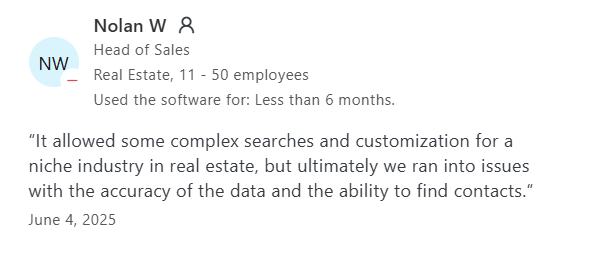
Many small businesses find ZoomInfo expensive, with costs starting around $14,995 and high additional hidden fees for add-ons such as intent data or expanded data access. Users frequently complain about unresponsive or inadequate support from ZoomInfo, while it charges more than $13,000 for all pricing plans.
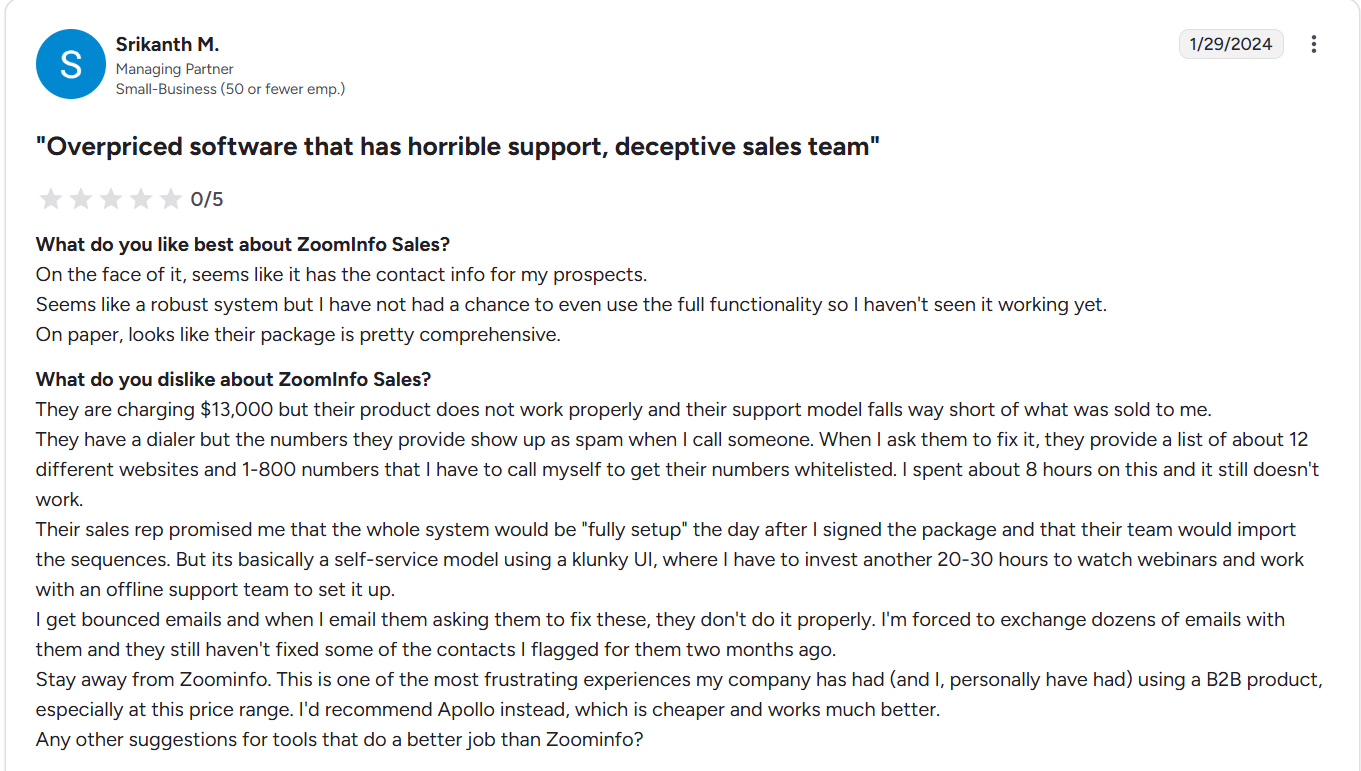
Several small businesses have concerns that ZoomInfo does not help them target their ICP (Ideal Customer Profile). ZoomInfo users report contract terms with long durations, auto-renewal clauses, and difficulties in cancelling subscriptions.
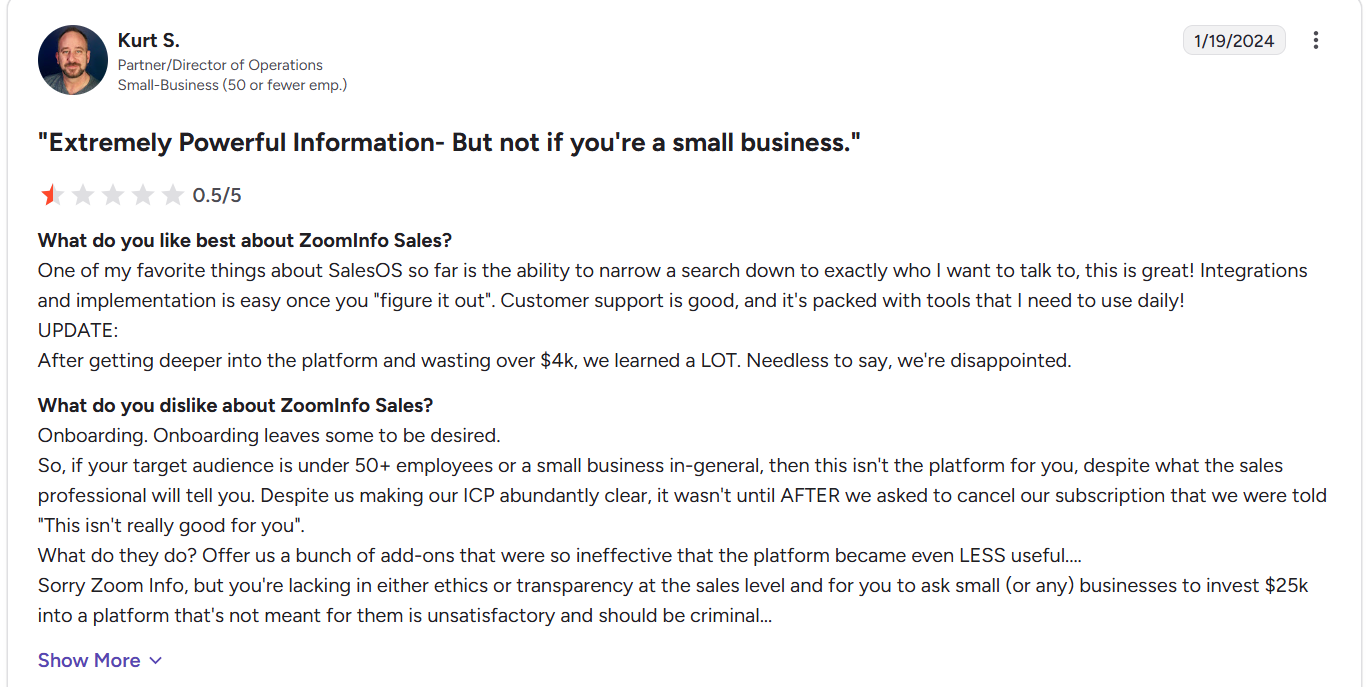
What are the best alternatives to ZoomInfo?
The best alternatives to ZoomInfo are BookYourData, UpLead, and Apollo.io. Each platform targets a different audience and offers different features according to the chosen plan.
BookYourData

BookYourData is a B2B data intelligence platform that provides real-time verified contact information, such as phone numbers and emails, to sales teams, recruiters, and marketers. The main difference between BookYourData and ZoomInfo is that BookYourData provides 24/7 support, while ZoomInfo provides customer support only during business hours.
Features
- Real-time verified B2B contact data across 250+ million contacts in 200+ countries.
- Built-in email verification with a 97% accuracy guarantee for high email deliverability.
- Advanced filtering using over 100 criteria, such as job title, industry, location, company size, and technographics.
- Flexible pay-as-you-go pricing model with no subscriptions and non-expiring credits.
- Smooth CRM integrations with platforms like Salesforce, HubSpot, and Pipedrive.

Pros
- High data accuracy with a triple-verified data process, such as AI validation, automation, and manual research.
- Global data coverage to help companies target their prospects in numerous industries and regions.
- User-friendly interface
- Strong focus on thought leadership and educational resources, such as blogs, books, and webinars.
Cons
- Fewer advanced sales intelligence and intent data tools
- Higher pricing tiers for small businesses
UpLead

UpLead is a B2B lead intelligence software that offers access to over 160 million verified business contacts to help sales teams generate accurate lead lists. UpLead and ZoomInfo differ in that UpLead tracks over 16,000 technologies used by companies based on technology stacks, while ZoomInfo offers a larger database with real-time insights on over 20 million companies.
Features
- Real-time email verification with a 95% accuracy guarantee to ensure deliverability.
- More than 50 filters for precise lead targeting, such as job title, industry, location, revenue, and technology usage.
- Data enrichment capabilities that improve existing contact lists with missing information.
Pros
- User-friendly platform focused on lead generation and data quality.
- Affordable pricing as compared to larger sales intelligence platforms.
Cons
- Limited built-in outreach and automation features compared to sales and engagement platforms.
- Occasional syncing delays or manual refresh requirements for large data volumes in some CRMs.
- Some users report issues with automatic subscription renewals and billing transparency.
Apollo.io

Apollo.io is an AI-powered end-to-end sales platform that helps businesses find, engage, and close leads with the help of a large B2B contact database, sales automation, and AI intelligence. The main difference between ZoomInfo and Apollo is that ZoomInfo is for larger teams and Apollo is for small to medium-sized businesses.
Features
- Access to a massive database with over 210 million contacts and 35 million companies.
- AI-powered outreach automation, which includes multi-channel email sequences and call assistance.
- Built-in tools for call recording and meeting scheduling.
Pros
- AI tools improve outreach, personalization, and pipeline efficiency.
- Competitive pricing with flexible plans suited for SMBs and startup companies.
Cons
- Some data accuracy inconsistencies, such as outdated contacts and bounced emails.
- The credit-based pricing model makes it difficult to reach out to multiple prospects.
- Customer support and response times from Apollo’s team need much improvement.
What to know more about ZoomInfo?
To know more about ZoomInfo, consider the features it provides, such as automation, data accuracy, and integrations. This B2B prospecting platform provides access to 321 million professional contacts and 100 million contacts for B2B buyers. It automates repetitive sales tasks through sales automation features, such as lead enrichment, follow-ups, and notifications, which allow sales teams to focus on high-value activities and close more deals. This B2B platform maintains data accuracy using proprietary technology and artificial intelligence to continuously update its vast database.
ZoomInfo updates its database while maintaining compliance with privacy regulations to protect sensitive information. It offers integrations with several CRMs, which include Oracle, Microsoft Dynamics 365, Harte Hanks, HubSpot, Marketo, SugarCRM, People.ai, Top Echelon, Pipedrive, Salesforce, SpringDB, Zoho, and Microsoft Dynamics 365 for Chorus.
Is ZoomInfo affordable for small businesses?
No, ZoomInfo is not affordable for small businesses, as its costs start around $14,995 per year. Its user interface is also complex for startups, which require more time and investment to learn the tool. ZoomInfo is more suitable for larger enterprises that have more lead generation needs and complex sales processes.
How can I remove my personal information from ZoomInfo?
To remove your personal information from ZoomInfo, you must submit a removal request online through the ZoomInfo privacy center or send an email to their official address, which is privacy@zoominfo.com. You can also call ZoomInfo at (833) 901-0859, which is their official number.
Does ZoomInfo offer customer support for issues and inquiries?
Yes, ZoomInfo offers customer support for issues and inquiries through various channels, such as direct phone calls, web forms, and the Help Center. ZoomInfo users can also check out the FAQs section on their official website to find answers to their queries.
Is Salesgenie more legitimate than ZoomInfo?
Yes, Salesgenie is more legitimate than ZoomInfo since its lead data is more reliable, and it is a suitable option for businesses that focus on high-quality leads. Both Salesgenie and ZoomInfo serve different user and business needs, but Salesgenie is ideal for small businesses, and ZoomInfo is suitable for large businesses.
Is ZoomInfo more reliable than Lusha when it comes to accurate business contact data?
Yes, ZoomInfo is more reliable than Lusha when it comes to accurate business contact data, especially for large enterprises, due to its larger database. The main difference between Lusha and ZoomInfo is that ZoomInfo offers several filtering options, advanced workflow automation, and features important for large enterprises, while Lusha lacks these features and is ideal for small businesses.
How does ZoomInfo compare to Cognism in terms of legitimacy and data quality?
ZoomInfo compares to Cognism in terms of legitimacy and data quality, as Cognism uses GDPR-first data practices, provides highly accurate verified mobile numbers, and has better data cleanliness. ZoomInfo has a lower call connect rate and relies more on proprietary sources for intent data and compliance tools. The main difference between Cognism and ZoomInfo is that ZoomInfo complies with data privacy laws like GDPR and CCPA, while Cognism complies with ISO 27001 and ISO 27701.
Is ZoomInfo a better choice than Seamless.AI for finding verified sales leads?
No, ZoomInfo is not a better choice than Seamless.AI for finding verified sales leads, as it is not ideal for beginners and requires time to learn. The main difference between Seamless.AI and ZoomInfo is that Seamless.AI is better for individuals and small businesses targeting a smaller volume of leads, while ZoomInfo is suitable for large enterprises that have more budget.
Can ZoomInfo competitors offer better value without compromising legitimacy?
Yes, ZoomInfo competitors offer better value without compromising legitimacy, particularly regarding pricing and essential features. ZoomInfo’s alternatives like Cognism, Apollo.io, Lusha, and UpLead provide strong compliance standards, verified data, and advanced features at more affordable prices.
Are RocketReach’s results as trustworthy as ZoomInfo’s for verified business leads?
No, RocketReach results are not as trustworthy as ZoomInfo’s for verified leads because ZoomInfo uses AI to continuously update and verify its database. The main difference between ZoomInfo and RocketReach is that RocketReach has been criticized for potential data accuracy issues, while ZoomInfo’s data verification process has received positive feedback from users.
Is ZoomInfo a better choice than Apollo.io for accurate B2B lead generation?
Yes, ZoomInfo is a better choice than Apollo.io for accurate B2B lead generation because it provides data accuracy and comprehensive business intelligence. The main difference between ZoomInfo and Apollo.io is that ZoomInfo is suitable for larger teams, and Apollo.io is ideal for small to medium-sized businesses.
[CTA1]
[CTA2]











